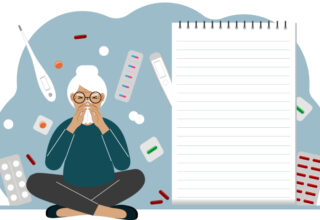Constipation is something almost everyone deals with at some point, whether it’s from travel, diet changes, or stress. It’s a common digestive issue that affects people of all ages. While it might not be a serious problem, constipation can definitely affect your quality of life, especially if it sticks around for too long.
In this blog, we are going to break down what constipation really means, what might cause it, how you can manage it, and when it’s time to check with your doctor.
What is Constipation?
Simply put, constipation means you’re not going as often as usual, or when yo do it’s difficult to pass. It can often come with symptoms like bloating and abdominal discomfort.
It is generally defined as having less than three bowel movements per week.
Everyone’s bathroom habits are different. Some people may go several times a day, while others may have a movement once or twice a week. The key is knowing what’s normal for your body. As long as your routine stays consistent, there is usually no need to worry.
Symptoms:
Heer’s how to know if you’re dealing with constipation:
- You have had less than three bowel movements per week, or you are going less often than usual.
- Your stools look dry, hard, or lumpy and are difficult to pass.
- You have to strain or feel pain when trying to pass stool.
- You feel like you haven’t emptied your bowel completely.
- You have tummy pain or cramps.
- You feel bloated or nauseated.
Causes:
There are many things that can cause constipation. Some of the most common culprits include:
- Not eating enough fiber— fiber helps bulk up and soften stool, making it easier to pass. Diet low in fruits, vegetables, and whole grains can lead to constipation.
- Lack of physical activity can slow down your digestive system. People who are physically inactive, especially older adults are more likely to experience constipation.
- Dehydration— when your body doesn’t have enough water, your intestines absorb more water from your waste, leading to hard and dry stools.
- Delaying the urge to have a bowel movement can cause the stool to become harder and more difficult to pass over time.
- Certain Medications like painkillers (especially opioids), antidepressants, calcium channel blockers, and iron supplements, can cause constipation as a side effect.
- Medical conditions like hypothyroidism, diabetes, irritable bowel syndrome (IBS), and neurological disorders like Parkinson’s disease, stroke, and multiple sclerosis, can also cause constipation.
- Stress and anxiety— the brain and gut are deeply connected. High levels of stress and anxiety can also cause constipation. (Learn more about how stress affects the body and mind).
Risk Factors:
Most people deal with constipation now and then, but there are some factors that increase the likelihood of developing it. These include:
- Older age— people over the age of 65 often have slower digestion, reduced physical activity, and weaker muscle contractions in the gut, all these factors increase the likelihood of developing constipation.
- Hormonal changes— pregnancy and the postpartum can slow bowel movements, especially as the growing uterus presses on the intestines.
- Low fiber intake— a diet low in fiber can also slow digestion and lead to harder stools.
- Certain medications— some drugs like opioid pain relievers (e.g morphine) and tricyclic antidepressants (e.g amitriptyline) can cause constipation as a side effect.
- Underlying health issues— neurological or digestive disorders can also disrupt normal bowel function.
Management and Treatment:
The good news is that a few simple tweaks in your daily routine can go a long way in managing constipation.
Here are some things you can try that actually help:
- Drink plenty of water— a few extra glasses of water a day can help. Try to avoid fizzy drinks and caffeine, as they can make you dehydrated.
- Watch what you eat— limit processed meats, fried foods, and refined carbs like white bread and pasta. Choose lean protein, low-fat dairy, and fiber rich foods instead.
- Add more fiber— add fruits, vegetables, whole grains, and other high fiber foods in your diet.
- Exercise regularly— physical activity can help stimulate your digestive system.
- Mind your bathroom posture— try to raise your knees above your hips while on the toilet. Sitting in a squatting position (by using a footstool) can make bowel movements easier.
- Avoid delaying the urge— ignoring the urge to defecate and holding it in can disrupt your body’s natural signals and make constipation worse.
- Limit distractions— avoid reading, or using your phone on the toilet, as it can delay bowel movements.
- Keep a food diary— track your meals to identify the foods that cause constipation.
- Medication Review— sometimes, constipation is caused or worsened by some medications or supplements. If you take any medications or supplements and have constipation, talk to your healthcare provider. They may adjust your dose or switch your medication. Always talk to your doctor before stopping any medication.
- If diet and lifestyle changes are not working, over-the-counter options might help. You can consider over-the-counter supplemental fiber, stool softeners or laxatives, and enemas.
Mild laxatives like docusate can offer short-term relief, but using them too often without medical advice, might make things worse.
If you’re not sure what to try, you can ask your pharmacist or doctor and they can point you in the right direction.
If over-the-counter medications are not effective, your doctor may prescribe medicines like:
- Lubiprostone
- Linaclotide
- Plecanatide
- Lactulose
These are usually considered when chronic constipation doesn’t respond to other treatments.
When to See a Doctor:
While occasional constipation is usually nothing to worry about, it’s important to know when to seek medical advice. Talk to your doctor if you’re:
- Having constipation longer than three weeks.
- Experiencing severe abdominal pain or bloating.
- having blood in your stool.
- Having unintentional weight loss.
- Experiencing persistent nausea or vomiting.
- Noticing a sudden change in your bowel habits without a clear reason.
- Taking any medication like opioid painkillers, that is causing constipation.
Final thoughts:
Constipation is common, but a few small, steady changes like drinking more water, eating more fiber, and moving your body, can often get things back on track. And if things don’t improve, don’t hesitate to see your doctor.
Your gut plays an important part in keeping you healthy, so take proactive steps to support your digestive health.








